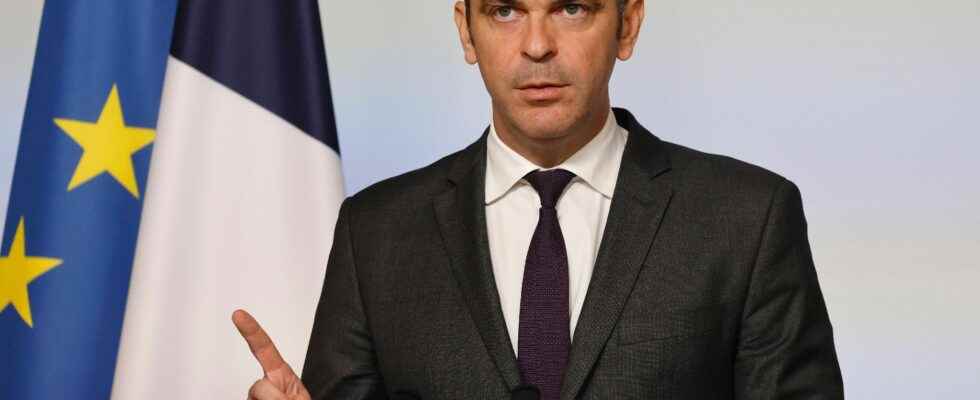“We never intended to scare the French.” Here he is constrained and forced to return to it. Again and again. Guest of the Grand Jury RTL-Le Figaro-LCI this Sunday noon, the government spokesman, Olivier Véran, once again had to affirm that power cuts this winter were not “probable” and that the executive was “preparing for any eventuality” because “c ‘is [son] work to do it”. Proof that the chapter, opened on November 30 by the leak of the circular sent by Elisabeth Borne to the prefects to prepare for these famous load shedding: one, is not closed; two, still remains a source of concerns; three, denotes the difficulty for government communication to dismiss concerns. In a context where subjects of tension are accumulating – rising energy prices, at the gas pump, at supermarket checkouts – our Have political leaders lost what they most seek: the performativity of their speech… and, therefore, the attentive ear of the French?
Who better than Olivier Véran knows how much the words that come out of his mouth can, must have consequences. Him, the former Minister of Health, who, under the authority of Emmanuel Macron and within the governments of Edouard Philippe then Jean Castex, transformed the life of the country even in the living room of his fellow citizens to fight against the Covid-19 epidemic. Fighting a virus that is already there is no small feat, but facing the anxieties generated by a hypothetical situation, cuts that may never appear, is another story. The spokesperson knows since the beginning of the month tightrope walker on a ridge line: not to talk about it would be seen as a mark of amateurism and unpreparedness; mentioning it to demonstrate that the government anticipates multiplies the attention paid to this risk and, consequently, the concerns. Is there really a good solution? “Today in government, there is an obsession with preparing minds at all costs, which comes directly from the Covid period, but by showing that you want to anticipate, you open a Pandora’s box in which everyone world is sinking”, deciphers a ministerial adviser, who must recognize that “in any case, you are the loser”.
“The spokesperson for Enedis made a big dumpling”
Especially when an ally becomes one evening, without warning, a pebble in the shoe. A rock. The best communication in the world, whether it comes from the government spokesperson or the Prime Minister, does it hold up against a bird of bad omen such as the spokesperson for Enedis? On December 5, Laurent Méric indicated on BFMTV that people at high vital risk will not be “priority” and “possibly shedding”. In short, that individuals on respirators at home have reason to start worrying… The art of defeating all the efforts made to appease the French in a lesson at prime time. “The spokesperson for Enedis made a big mess, if he hadn’t come out, we would have increased in power in public opinion, but he created an emotion that escaped politics, yes. We had bad luck with him”, slips us a close friend of Elisabeth Borne.
From this moment on, the performativity of governmental speech takes a big hit. How to convince when the services on which the executive is supposed to rely, neutral, objective, do not play the same score? “The politician who delivers a reassuring message finds himself embarrassed by an expert who says something like that and who has, moreover, seen his position, the concrete power to cut off the electricity tap. It’s difficult to fight”, regrets an executive communicator. The spokesperson, like various ministers invited on the sets, may not spare their efforts to recover “the dumpling”, the damage is done. Only Emmanuel Macron himself, from Albania the next day, is able to move the lines a little bit, by castigating the attitude of the spokesperson for Enedis and the “scenarios of fear”. Proof, if one were needed, that the Head of State is the only one to break the sound barrier. “It is undoubtedly the consequence of decades of growing distrust of political speech. It is up to politicians to renew their way of passing on messages, perhaps by limiting them, moreover”, blows a Deputy close to the President of the Republic.
There are, however, grounds for satisfaction. The calls for sobriety launched by the government since the summer have obviously borne fruit, judging by the figures announced by Enedis, which noted an 8.4% drop in electricity consumption. But the coming weeks will put a strain on executive speakers, who know how much the slightest spark can cause a national stir. “As soon as we say something at the moment, it can go off the rails”, can only see Elisabeth Borne in a small committee. Could this evil be particularly French? Sometimes, the head of government reveals her astonishment, even her incomprehension, in the face of the extent of the reactions aroused by the announcements of possible load shedding. Why so much electricity in the air here, while our neighbors do more or less the same thing elsewhere, without receiving the same grievances? She herself cannot explain it. The Prime Minister even said a word about it to the head of the German government, Olaf Scholz, whose country is in a much more complicated energy situation. Across the Rhine, no controversy, no panic. For a few seconds, she would have almost envied the Chancellor…
